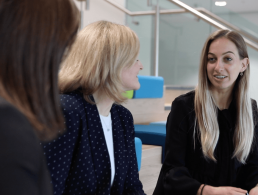Dr Derek Molloy gives us an introduction to the master’s in IoT at DCU, which is aimed at professionals seeking to upskill with an education in the internet of things.
Today, the internet we know is an internet of people. The internet of things (or IoT) expands the internet to include billions of devices, or things, intercommunicating together to improve our lives and the way we work.
Working in the internet of things involves developing devices, sensors, network communication frameworks and web applications to support the IoT.
Devices that people might be familiar with include Google Home and Amazon’s Alexa products. For example, I have a Google Nest that manages my heating and hot water by learning my preferences and adjusting my settings depending on the weather forecast, and automatically shuts my heating down if I am away for the weekend, saving energy and money. Nest integrates with smoke alarms, cameras and switches, allowing me to ask Google to turn on the kitchen lights.
From smart homes to industry 4.0
The IoT is only just emerging, so many of the applications are in their infancy. I am an early adopter, but my smart home manages many tedious daily tasks, such as turning on outside lights when it gets dark, or recording video when someone approaches my front door.
If the IoT is successful, I expect that these connected devices will fade into the background and we won’t even know they are present. For example, when we walk into a room, the lights will come on automatically and the environment will be adjusted instantly to our preferences. My car will be charged depending on my diary for the following day and my house will be automatically secured when I leave.
But the vast majority of the IoT will be for industrial environments rather than home environments. Today, manufacturing robots are able to adjust their behaviour automatically depending on interaction with their human operators.
They can notify technical support when they are in need of servicing, and can be dynamically reprogrammed when new algorithms are developed. This is often called industry 4.0 and is very much in its infancy.
Building the new IoT workforce
There are a lot of challenges to be solved by engineers around interoperability standards, network communication, indoor localisation, security and privacy. However, the factor that would most accelerate the emergence of the IoT is skilled engineers and technology evangelists.
There are so many varied and interesting challenges to be solved in getting the IoT to where we would like it to be that a very large, skilled workforce is required.
The master’s in IoT, sponsored by the Technology Ireland Software Skillnet and developed and delivered by Dublin City University (DCU), has been designed to address this demand. The course is aimed at people employed in Ireland and seeking career development through an education in IoT.
For those interested in pursuing a career in IoT, I think that it’s very important that they obtain a full stack knowledge of the internet of things. Right from interfacing sensors to microcontrollers and microprocessors, to wired and wireless network communication, security frameworks, and software development for web applications.
The master’s in IoT provides these key skills through modules such as connected embedded systems, machine learning, wireless security, network stack implementation and web app development. We are conscious that new students are coming to us from diverse backgrounds so there are support modules in programming and mathematics to build confidence in the materials to follow.
The programme is also very applied in that a significant portion of the marking is for a project element that can be integrated with the work environment. All the modules are online, allowing students to study at a pace that suits them, while being part of a cohort who are all studying for a common award.
Dr Derek Molloy is an associate professor in the School of Electronic Engineering at Dublin City University. He lectures in connected embedded systems, object-oriented programming, and digital and analogue electronics at postgraduate and undergraduate levels.




